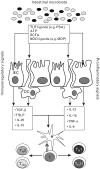The intestinal microbiota in health and disease: the influence of microbial products on immune cell homeostasis
- PMID: 19770652
- PMCID: PMC4737592
- DOI: 10.1097/MOG.0b013e328331b6b4
The intestinal microbiota in health and disease: the influence of microbial products on immune cell homeostasis
Abstract
Purpose of review: A vast and diverse array of microbes colonizes the mammalian gastrointestinal tract. These microorganisms are integral in shaping the development and function of the immune system. Metagenomic sequencing analysis has revealed alterations in intestinal microbiota in patients suffering from chronic inflammatory diseases, including inflammatory bowel disease and asthma. This review will discuss the mechanisms through which the innate immune system recognizes and responds to the intestinal microbiota as well as the effect of specific microbiota-derived signals on immune cell homeostasis.
Recent findings: Recent studies in murine model systems have demonstrated that manipulation of the intestinal microbiota can alter mammalian immune cell homeostasis. Specific microbial signals have been identified that can impact immune cell function both within the intestinal tract and in peripheral tissues. These microbiota-derived signals can either have an immunoregulatory effect, creating an immune state that is refractory to inflammation, or conversely, act as an adjuvant, aiding in the propagation of an immune response.
Summary: Associations between alterations in the microbiota and human disease implicate intestinal microbial signals in shaping immune responses. These signals are recognized by innate immune cells and influence the ability of these cells to modulate both the local and systemic immune response.
Figures

Comment in
-
Immunology.Curr Opin Gastroenterol. 2009 Nov;25(6):491-5. doi: 10.1097/MOG.0b013e3283325d19. Curr Opin Gastroenterol. 2009. PMID: 19770651 No abstract available.
References
-
- Savage DC. Microbial ecology of the gastrointestinal tract. Annu Rev Microbiol. 1977;31:107–133. - PubMed
-
- Ley RE, Turnbaugh PJ, Klein S, Gordon JI. Microbial ecology: human gut microbes associated with obesity. Nature. 2006;444:1022–1023. - PubMed
-
- Turnbaugh PJ, Ley RE, Mahowald MA, et al. An obesity-associated gut microbiome with increased capacity for energy harvest. Nature. 2006;444:1027–1031. - PubMed
Publication types
MeSH terms
Substances
Grants and funding
- R01 AI074878/AI/NIAID NIH HHS/United States
- T32-CA09140-30/CA/NCI NIH HHS/United States
- T32-AI055438-06/AI/NIAID NIH HHS/United States
- F32-AI72943/AI/NIAID NIH HHS/United States
- T32 CA009140/CA/NCI NIH HHS/United States
- T32 AI055438/AI/NIAID NIH HHS/United States
- T32-AI007532-08/AI/NIAID NIH HHS/United States
- AI74878/AI/NIAID NIH HHS/United States
- F31 GM082187/GM/NIGMS NIH HHS/United States
- R01 AI061570/AI/NIAID NIH HHS/United States
- T32-AI05528/AI/NIAID NIH HHS/United States
- T32 AI007532/AI/NIAID NIH HHS/United States
- F31-GM082187/GM/NIGMS NIH HHS/United States
- F32 AI072943/AI/NIAID NIH HHS/United States
- AI61570/AI/NIAID NIH HHS/United States
LinkOut - more resources
Full Text Sources
Other Literature Sources
Research Materials

